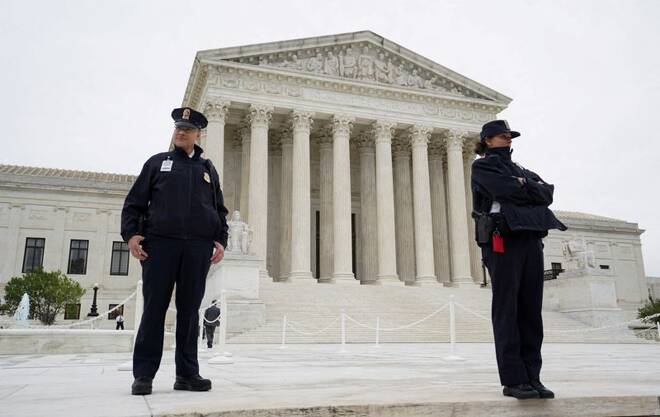Advertisement
Advertisement
U.S. Supreme Court rejects Christian preacher’s challenge to university
By:
By John Kruzel WASHINGTON - The U.S. Supreme Court on Monday declined to hear a traveling Christian evangelist's free-speech challenge to a University of Alabama requirement that he obtain a permit before handing out religious pamphlets and preaching from a sidewalk adjacent to its campus.
By John Kruzel
WASHINGTON -The U.S. Supreme Court on Monday declined to hear a traveling Christian evangelist’s free-speech challenge to a University of Alabama requirement that he obtain a permit before handing out religious pamphlets and preaching from a sidewalk adjacent to its campus.
The justices turned away an appeal by preacher Rodney Keister of a lower court’s ruling rejecting his claim that the university’s permit requirement violated free speech rights under the U.S. Constitution’s First Amendment.
Keister, founder of a Pennsylvania-based group called Evangelism Mission, regularly visits U.S. university campuses in hopes of spreading his Christian message to students, according to court filings.
In 2016, Keister, along with a companion, preached using an amplifier and distributed Christian literature from a sidewalk adjacent to the University of Alabama campus in Tuscaloosa, trying to engage passersby. School officials told Keister he needed a permit for a public-speaking event, prompting him and his companion to leave.
The university’s policy at issue governed when, where and how a person unaffiliated with the school may engage in public speaking on campus including on sidewalks, other than “casual recreational or social activities.” It required a permit application 10 business days in advance – which has since been reduced to five business days – and sponsorship by a student organization or university academic department.
Keister in 2017 filed a civil rights suit against University of Alabama officials, arguing that the sidewalk’s status under the First Amendment is that of a “traditional public forum,” affording speakers the most robust protections available under the Constitution. Following losses in lower courts, Keister’s appeal in 2018 was turned away by the U.S. Supreme Court, prompting him to file an amended civil rights suit against school officials the next year.
A federal judge in 2020 ruled in favor of the school officials, finding that the sidewalk was a “limited public forum” – a status giving public universities and other government entities more leeway to regulate particular classes of speakers or kinds of speech. The Atlanta-based 11th U.S. Circuit Court of Appeals agreed last year.
Erik Jaffe, an attorney for Keister, expressed disappointment over the Supreme Court’s decision to turn away his client’s appeal.
“Whether public sidewalks remain traditional public forums with full First Amendment protection for free speech, regardless of their proximity to university or other restricted-use property, remains an important and unsettled issue, marked by inconsistent and unpredictable decisions,” Jaffe said. “We hope that the Supreme Court eventually steps in to rationalize and expand constitutional protections in this area, even if they passed on this current opportunity to do so.”
Lawyers representing the University of Alabama officials did not immediately respond to a request for comment.
The Supreme Court, which has a 6-3 conservative majority, in recent years has taken an expansive view of religious rights, though this case came to the justices as a free speech dispute.
The high court is due to rule by the end of June in another free speech case involving religion. The court’s conservative justices during arguments in December appeared ready to rule that a Christian web design business owner named Lorie Smith has a right to refuse to provide services for same-sex marriages. Smith has said that under her Christian beliefs marriage should be limited to opposite-sex couples.
(Reporting by John Kruzel; Editing by Will Dunham)
About the Author
Reuterscontributor
Reuters, the news and media division of Thomson Reuters, is the world’s largest international multimedia news provider reaching more than one billion people every day. Reuters provides trusted business, financial, national, and international news to professionals via Thomson Reuters desktops, the world's media organizations, and directly to consumers at Reuters.com and via Reuters TV. Learn more about Thomson Reuters products:
Advertisement
